You are using an out of date browser. It may not display this or other websites correctly.
You should upgrade or use an alternative browser.
You should upgrade or use an alternative browser.
Essential The Africa the Media Doesn't Tell You About
- Thread starter TommyHilltrigga
- Start date
More options
Who Replied?Zimbabwe Economic Meltdown Worrying Botswana
3.4.201612:36
by VOAJump to comments




GABORONE, BOTSWANA — Recent developments increasingly point to a Botswana government getting weary of the economic meltdown in Zimbabwe.

FILE: Botswana President Ian Khama (L) walks alongside Zimbabwe President Robert Mugabe (R) during a lunch break at the SADC summit in Maputo, June 15, 2013.
From the recently introduced shoot-to-kill stray Zimbabwean cattle to suggesting Zimbabwe prison inmates should serve terms in their own country, Botswana’s agitation is coming to the fore.
Botswana has always maintained cordial relations with Zimbabwe despite bearing the burden of an influx of illegal immigrants from its neighbor.
An estimated 1,000 Zimbabweans cross into Botswana daily for shopping but critically to look for jobs which have proved elusive in their homeland.
With the economic slowdown in Zimbabwe showing no signs of abating, Botswana is fast showing signs of agitation.
Botswana recently announced that it would shoot to kill stray Zimbabwean cattle as it fights the resurfacing foot and mouth disease which has persisted over the years.
The spread of the disease is blamed on illegal immigrants who cut the fence along the two countries’ borders, thereby allowing animals to roam free.
Other immigrants illegally cross with fruits and vegetables for re-sale, in the process carrying across the fruit fly, which causes crop diseases.
Botswana has suggested that the more than 500 Zimbabweans incarcerated at various prisons in its country should be sent back to their homeland to serve the remainder of their sentences.
Political commentator, Thato Kereng, says Botswana is being affected by the meltdown in Zimbabwe.
“Botswana is affected because of the situation in Zimbabwe. Now they are forced to tighten with the introduction of the various interventions.”
He argues that the moves taken by Botswana are in the interest of its citizens. “I think it’s understandable. If you have a neighbor like Zimbabwe and the situation is affecting you, you have to take steps to make sure you protect your own interests and your own people.”
Zimbabwean Clement Zibanani feels as long as the situation in his country persists, the challenges will remain, arguing the solution lies within Zimbabwe.
His fellow countryman, Farai Sibanda, says it is unfortunate that it is the ordinary people who feel the pinch, but believes it’s a clear message to the Harare authorities to clean up their mess, which is now affecting neighboring countries.
At times Botswana has been the lone critical voice, particularly at Southern African Development Community meetings, with President Ian Khama praised for his candid views.
Zimbabwe Economic Meltdown Worrying Botswana - The Zimbabwean
3.4.201612:36
by VOAJump to comments
GABORONE, BOTSWANA — Recent developments increasingly point to a Botswana government getting weary of the economic meltdown in Zimbabwe.

FILE: Botswana President Ian Khama (L) walks alongside Zimbabwe President Robert Mugabe (R) during a lunch break at the SADC summit in Maputo, June 15, 2013.
From the recently introduced shoot-to-kill stray Zimbabwean cattle to suggesting Zimbabwe prison inmates should serve terms in their own country, Botswana’s agitation is coming to the fore.
Botswana has always maintained cordial relations with Zimbabwe despite bearing the burden of an influx of illegal immigrants from its neighbor.
An estimated 1,000 Zimbabweans cross into Botswana daily for shopping but critically to look for jobs which have proved elusive in their homeland.
With the economic slowdown in Zimbabwe showing no signs of abating, Botswana is fast showing signs of agitation.
Botswana recently announced that it would shoot to kill stray Zimbabwean cattle as it fights the resurfacing foot and mouth disease which has persisted over the years.
The spread of the disease is blamed on illegal immigrants who cut the fence along the two countries’ borders, thereby allowing animals to roam free.
Other immigrants illegally cross with fruits and vegetables for re-sale, in the process carrying across the fruit fly, which causes crop diseases.
Botswana has suggested that the more than 500 Zimbabweans incarcerated at various prisons in its country should be sent back to their homeland to serve the remainder of their sentences.
Political commentator, Thato Kereng, says Botswana is being affected by the meltdown in Zimbabwe.
“Botswana is affected because of the situation in Zimbabwe. Now they are forced to tighten with the introduction of the various interventions.”
He argues that the moves taken by Botswana are in the interest of its citizens. “I think it’s understandable. If you have a neighbor like Zimbabwe and the situation is affecting you, you have to take steps to make sure you protect your own interests and your own people.”
Zimbabwean Clement Zibanani feels as long as the situation in his country persists, the challenges will remain, arguing the solution lies within Zimbabwe.
His fellow countryman, Farai Sibanda, says it is unfortunate that it is the ordinary people who feel the pinch, but believes it’s a clear message to the Harare authorities to clean up their mess, which is now affecting neighboring countries.
At times Botswana has been the lone critical voice, particularly at Southern African Development Community meetings, with President Ian Khama praised for his candid views.
Zimbabwe Economic Meltdown Worrying Botswana - The Zimbabwean
Once cash-rich Angola, hit by collapse of oil prices, goes knocking on IMF's door for aid
06 APR 2016 20:32AFP
100
An oil platform of the Italian Saipaem company situated off Angola in a past photograph. (Photo/AFP).
ANGOLA said Wednesday it had asked the International Monetary Fund for help after the crash in oil prices ravaged government finances.
The IMF said discussions would begin next week in Washington on what could be a three-year support plan for the government.
“The sharp decline in oil prices since mid-2014 represents a major challenge for oil exporters, especially for those economies that have yet to become more diversified,” the Fund said in a statement.
“The IMF stands ready to help Angola address the economic challenges it is currently facing by supporting a comprehensive policy package to accelerate the diversification of the economy, while safeguarding macroeconomic and financial stability.”
Angola has depended on oil production for 95% of its export earnings and more than half of government receipts.
It’s current economic difficulties represent a significant deterioration in fortunes. In 2014, it saw net oil export revenue plunge by more than 12% to $24 billion, due to tumbling production and crude prices. Its earnings for 2015 were further down sharply, with Sonangol, the state-owned company that oversees petroleum and natural gas production in Angola, saying it posted income of $14.38 billion, “lower by about 34 percent against total revenue in 2014.”
In a statement, the government said it “is aware that the high reliance on the oil sector represents a vulnerability to the public finances and the economy more broadly.”
Angola “will work with the IMF to design and implement policies and structural reforms aimed at improving macroeconomic and financial stability, including through fiscal discipline,” the statement read.
IMF three-year Extended Fund Facility programmes usually offer financial support for government finances while requiring disciplined reforms, which often include spending cuts and stronger tax collection efforts.
Angola had a previous three-year support programme from the IMF, a $1.4 billion Stand-By Arrangement during 2009-2012. This helped the country resolve domestic debts, stabilise its exchange rate, and shore up its international reserves.
Under the proposed new programme, the government said it “is committed to improving transparency in the public finances and the banking sector.”
“There is a strong belief within the government that the continued drive towards enhanced transparency can be accelerated by partnering with an institution like the IMF.”
Once cash-rich Angola, hit by collapse of oil prices, goes knocking on IMF's door for aid
06 APR 2016 20:32AFP
100

An oil platform of the Italian Saipaem company situated off Angola in a past photograph. (Photo/AFP).
ANGOLA said Wednesday it had asked the International Monetary Fund for help after the crash in oil prices ravaged government finances.
The IMF said discussions would begin next week in Washington on what could be a three-year support plan for the government.
“The sharp decline in oil prices since mid-2014 represents a major challenge for oil exporters, especially for those economies that have yet to become more diversified,” the Fund said in a statement.
“The IMF stands ready to help Angola address the economic challenges it is currently facing by supporting a comprehensive policy package to accelerate the diversification of the economy, while safeguarding macroeconomic and financial stability.”
Angola has depended on oil production for 95% of its export earnings and more than half of government receipts.
It’s current economic difficulties represent a significant deterioration in fortunes. In 2014, it saw net oil export revenue plunge by more than 12% to $24 billion, due to tumbling production and crude prices. Its earnings for 2015 were further down sharply, with Sonangol, the state-owned company that oversees petroleum and natural gas production in Angola, saying it posted income of $14.38 billion, “lower by about 34 percent against total revenue in 2014.”
In a statement, the government said it “is aware that the high reliance on the oil sector represents a vulnerability to the public finances and the economy more broadly.”
Angola “will work with the IMF to design and implement policies and structural reforms aimed at improving macroeconomic and financial stability, including through fiscal discipline,” the statement read.
IMF three-year Extended Fund Facility programmes usually offer financial support for government finances while requiring disciplined reforms, which often include spending cuts and stronger tax collection efforts.
Angola had a previous three-year support programme from the IMF, a $1.4 billion Stand-By Arrangement during 2009-2012. This helped the country resolve domestic debts, stabilise its exchange rate, and shore up its international reserves.
Under the proposed new programme, the government said it “is committed to improving transparency in the public finances and the banking sector.”
“There is a strong belief within the government that the continued drive towards enhanced transparency can be accelerated by partnering with an institution like the IMF.”
Once cash-rich Angola, hit by collapse of oil prices, goes knocking on IMF's door for aid
Red Shield
Global Domination
Well Angola is fukked....
because once you go to that IMF door..
because once you go to that IMF door..

Kenya Power Partners With Safaricom to Connect More Kenyans to the Internet
6 APRIL 2016
Tagged:
By Margaret Njugunah
Nairobi — More Kenyans are set to be connected to broadband Internet following the signing of a Memorandum of Understanding (MoU) between Kenya Power and Safaricom Limited.
According to Kenya Power, the MoU will set the stage for the two firms to collaborate to implement a pilot fiber optic project aimed at providing Internet to homes through the electricity distribution network.
Safaricom, which has to date rolled out 3,200km of fiber reaching 7,000 homes, will lease additional broadband infrastructure built and owned by Kenya Power in order to roll out a "last mile" network, with the aim of connecting more homes to its broadband internet services.
According to Kenya Power's Managing Director and Chief Executive Officer Dr Ben Chumo, Kenya Power already owns and operates more than 4,000km in length of fiber optic cable network in Kenya, which it leases to the major telecom players in the country.
"The agreement will promote development and improvement of additional telecommunications infrastructure for effective and efficient provision of telecommunications services to both public and private institutions through provision of adequate, reliable and competitively-priced fiber networks," he added.
On its part, Safaricom through its CEO Bob Collymore said that the collaborative partnership will harness the strength of both partners to extend a new world of possibilities to their customers, in recognition of the transformative impact of the Internet.
"By leveraging on Kenya Power's electricity infrastructure we will not only be able to accelerate the rate of connection to homes, we will tackle challenges experienced in roll-out of broadband services and reduce the inconvenience caused to Kenyans when we are forced to dig trenches to lay the underground fiber optic cable grid," he said.
The project targets more than 12,000 homes in a 12-month pilot to be carried out in residential areas in and around Nairobi.
Kenya Power Partners With Safaricom to Connect More Kenyans to the Internet
6 APRIL 2016
Tagged:
By Margaret Njugunah
Nairobi — More Kenyans are set to be connected to broadband Internet following the signing of a Memorandum of Understanding (MoU) between Kenya Power and Safaricom Limited.
According to Kenya Power, the MoU will set the stage for the two firms to collaborate to implement a pilot fiber optic project aimed at providing Internet to homes through the electricity distribution network.
Safaricom, which has to date rolled out 3,200km of fiber reaching 7,000 homes, will lease additional broadband infrastructure built and owned by Kenya Power in order to roll out a "last mile" network, with the aim of connecting more homes to its broadband internet services.
According to Kenya Power's Managing Director and Chief Executive Officer Dr Ben Chumo, Kenya Power already owns and operates more than 4,000km in length of fiber optic cable network in Kenya, which it leases to the major telecom players in the country.
"The agreement will promote development and improvement of additional telecommunications infrastructure for effective and efficient provision of telecommunications services to both public and private institutions through provision of adequate, reliable and competitively-priced fiber networks," he added.
On its part, Safaricom through its CEO Bob Collymore said that the collaborative partnership will harness the strength of both partners to extend a new world of possibilities to their customers, in recognition of the transformative impact of the Internet.
"By leveraging on Kenya Power's electricity infrastructure we will not only be able to accelerate the rate of connection to homes, we will tackle challenges experienced in roll-out of broadband services and reduce the inconvenience caused to Kenyans when we are forced to dig trenches to lay the underground fiber optic cable grid," he said.
The project targets more than 12,000 homes in a 12-month pilot to be carried out in residential areas in and around Nairobi.
Kenya Power Partners With Safaricom to Connect More Kenyans to the Internet
Only 20% of Africans use the internet – we must fix this digital poverty now

Too many people in Africa don't have internet access
Image: REUTERS/Mike Hutchings
Written by
Elsie Kanza, Head of Africa, World Economic Forum
Published
Thursday 7 April 2016
The one thing I love most about my job is the countless brilliant, inspirational people I invariably get to meet when I am in Africa. As you can imagine, they are a diverse bunch: the Rwandan techpreneur pioneering smart card solutions for public transport; the Nigerian Global Shaper tracking an election tribunal via #TrackAkwaIbom; the South African innovator developing digital currency to expand opportunities for vulnerable youth in townships; the Ghanaian serial entrepreneur disrupting tertiary education with the Africa Leadership University; the Tanzanian start-up developing edu-cartoons; and the young scientists at the cutting edges of malaria research, the semantic web or the study of time. Or the people behind the project I was introduced to last month who aim to spearhead Africa’s space revolution by launching a constellation of communications satellites built by schoolgirls across the continent.
This all serves as proof, if ever any was needed, that Africa’s people – its greatest resource – collectively have the energy and talent to create a rich future for the continent. Couple this human ingenuity with the fact that technology has already helped bring about vast improvements in the way the region governs, feeds, lives, educates, trades and interacts with itself, and you have to conclude that the priority of every African leader today should be figuring out how to unleash this force for good as quickly as possible.
What would an ecosystem capable of supporting a smarter Africa look like? At the World Economic Forum, as part of our project on the Future of the Internet, we have done some work on this. We know that you need – alongside internet access – affordability, rich local content, a tech savvy population and an encouraging entrepreneurial environment.
Creating this ecosystem should not be an insurmountable task. After all, mobile telephony – perhaps the continent’s first genuine region-wide infrastructure – has already brought huge transformation in a relatively short amount of time. Imagine what Africa could achieve if the same levels of enthusiasm were matched in the development of a vibrant internet? Our region could be a leader in the growth of the blockchain revolution, for example, to name just one transformational new technology. And what if we were able to do what other regions of the world have so far failed to and develop a digital single market? Africa’s trading partners would then be seeking to follow for a change.
Initiatives like this will only work if everyone has access to the internet in the first place. For too many of us, this critical first step is still lacking. In fact, according to figures from the International Telecommunications Union, just over 20% of Africans have internet access.

Image: International Telecommunications Union
Ahead of the 2016 World Economic Forum on Africa, which takes place in Kigali on May 11-13, the Global Shapers, over 1,000 young people across 94 cities in Africa with the drive to make a contribution to their communities, are launching an #internet4all conversation. They will build on the traditional Rwandan culture ofUmuganda, which means “coming together in common purpose to achieve an outcome”. Their hope is to lead grassroots conversations about the opportunities and challenges related to the Fourth Industrial Revolution. We believe that, in the 21st century, this essential infrastructure should be available to everybody. Because, after all, all Africans want is the chance to create for themselves the future that they deserve.
Call to Action: how does #internet4all impact your life? Please join the conversation and put your issue on the agenda in Kigali.
Only 20% of Africans use the internet – we must fix this digital poverty now

Too many people in Africa don't have internet access
Image: REUTERS/Mike Hutchings
Written by
Elsie Kanza, Head of Africa, World Economic Forum
Published
Thursday 7 April 2016
The one thing I love most about my job is the countless brilliant, inspirational people I invariably get to meet when I am in Africa. As you can imagine, they are a diverse bunch: the Rwandan techpreneur pioneering smart card solutions for public transport; the Nigerian Global Shaper tracking an election tribunal via #TrackAkwaIbom; the South African innovator developing digital currency to expand opportunities for vulnerable youth in townships; the Ghanaian serial entrepreneur disrupting tertiary education with the Africa Leadership University; the Tanzanian start-up developing edu-cartoons; and the young scientists at the cutting edges of malaria research, the semantic web or the study of time. Or the people behind the project I was introduced to last month who aim to spearhead Africa’s space revolution by launching a constellation of communications satellites built by schoolgirls across the continent.
This all serves as proof, if ever any was needed, that Africa’s people – its greatest resource – collectively have the energy and talent to create a rich future for the continent. Couple this human ingenuity with the fact that technology has already helped bring about vast improvements in the way the region governs, feeds, lives, educates, trades and interacts with itself, and you have to conclude that the priority of every African leader today should be figuring out how to unleash this force for good as quickly as possible.
What would an ecosystem capable of supporting a smarter Africa look like? At the World Economic Forum, as part of our project on the Future of the Internet, we have done some work on this. We know that you need – alongside internet access – affordability, rich local content, a tech savvy population and an encouraging entrepreneurial environment.
Creating this ecosystem should not be an insurmountable task. After all, mobile telephony – perhaps the continent’s first genuine region-wide infrastructure – has already brought huge transformation in a relatively short amount of time. Imagine what Africa could achieve if the same levels of enthusiasm were matched in the development of a vibrant internet? Our region could be a leader in the growth of the blockchain revolution, for example, to name just one transformational new technology. And what if we were able to do what other regions of the world have so far failed to and develop a digital single market? Africa’s trading partners would then be seeking to follow for a change.
Initiatives like this will only work if everyone has access to the internet in the first place. For too many of us, this critical first step is still lacking. In fact, according to figures from the International Telecommunications Union, just over 20% of Africans have internet access.

Image: International Telecommunications Union
Ahead of the 2016 World Economic Forum on Africa, which takes place in Kigali on May 11-13, the Global Shapers, over 1,000 young people across 94 cities in Africa with the drive to make a contribution to their communities, are launching an #internet4all conversation. They will build on the traditional Rwandan culture ofUmuganda, which means “coming together in common purpose to achieve an outcome”. Their hope is to lead grassroots conversations about the opportunities and challenges related to the Fourth Industrial Revolution. We believe that, in the 21st century, this essential infrastructure should be available to everybody. Because, after all, all Africans want is the chance to create for themselves the future that they deserve.
Call to Action: how does #internet4all impact your life? Please join the conversation and put your issue on the agenda in Kigali.
Only 20% of Africans use the internet – we must fix this digital poverty now
ADB announces increased support to Mozambique in 2016/2017
APRIL 6TH, 2016
 HOME
HOME
The African Development Bank (ADB) plans to increase to US$1.7 billion the amount granted to Mozambique this year and 2017 to finance various projects, said Monday in Maputo the president of the institution.
Akinwumi Adesine at the end of an audience granted by the President of Mozambique, Filipe Nyusi, said that much of this funding would be focused on the agricultural sector, “given that Mozambique has the potential to be one of the most important storehouses of Africa.”
The President of the ADB, who made a three-day visit to Mozambique, said that the ADB intends to support, in addition to agriculture, the energy and transport sectors.
“We want to help Mozambique to industrialise agriculture, that is, our intention is to help the country diversify its economy,” said Adesine, quoted by news agency AIM.
Adesine told President Filipe Nyusi the African Development Bank will provide a grant of US$15 million to Mozambique to help people affected by drought in the central and southern parts of Mozambique and flooding in the north. (macauhub/MZ)
ADB announces increased support to Mozambique in 2016/2017 | Macauhub English
APRIL 6TH, 2016
The African Development Bank (ADB) plans to increase to US$1.7 billion the amount granted to Mozambique this year and 2017 to finance various projects, said Monday in Maputo the president of the institution.
Akinwumi Adesine at the end of an audience granted by the President of Mozambique, Filipe Nyusi, said that much of this funding would be focused on the agricultural sector, “given that Mozambique has the potential to be one of the most important storehouses of Africa.”
The President of the ADB, who made a three-day visit to Mozambique, said that the ADB intends to support, in addition to agriculture, the energy and transport sectors.
“We want to help Mozambique to industrialise agriculture, that is, our intention is to help the country diversify its economy,” said Adesine, quoted by news agency AIM.
Adesine told President Filipe Nyusi the African Development Bank will provide a grant of US$15 million to Mozambique to help people affected by drought in the central and southern parts of Mozambique and flooding in the north. (macauhub/MZ)
ADB announces increased support to Mozambique in 2016/2017 | Macauhub English

Identity 2016: The nation in love with country music
- 1 April 2016
- From the sectionMagazine
-
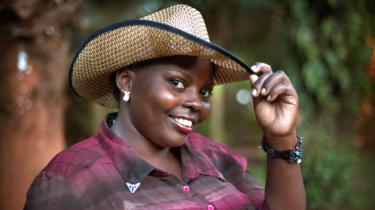
"I’ve been listening to country music for 10 years," says 23-year-old Maria Nakiweewa. "It’s not like Ugandan music. We love it, it’s in our blood."
-

Checked shirts, hats and cowboy boots are all part of the deal. Many fans even adopt country-style names instead of their own.
-
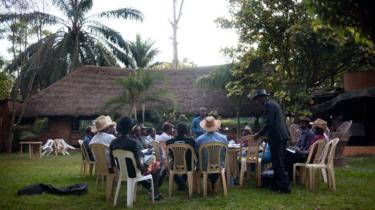
Fans often meet in Kampala and large numbers gather for the annual Let’s Go Country event, where horse riding and mud wrestling feature alongside live music. Last year the headline act was country singer Holly Tucker, from the American series of the TV show The Voice.
-
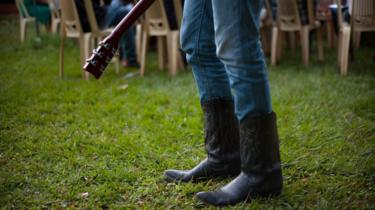
The most requested song on Kampala's Radio One station, from listeners of all ages, is Dolly Parton’s Coat of Many Colours. When the BBC told her, she said it's her favourite too and it touches on universal emotions. “We all have been made to feel less than who we are, whether it be about something we wear, our weight, a handicap, whatever it may be,” she says. “And that is not a good feeling. So I think it kinda eases that hurt in other people as it did in me.”
-
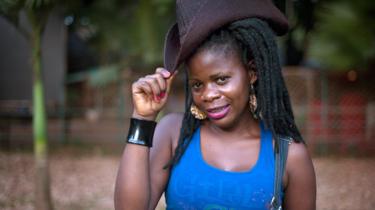
"Heaven in my ears," is how Susie Nancy - or Nansereko Susan - describes the music. "I feel good, I feel comforted listening to country music. Country music is a gift to those who accept it. It explains the story, sad stories and good stories, and you can dance if it means dancing, you can cry if it means crying, you can pray via country music, you can sleep, so it’s comforting."
-
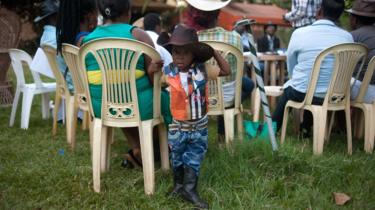
Three-year-old Alvin Kivumbi is already a fan. “He loves country music, he dances to every song,” says Nancy.
-
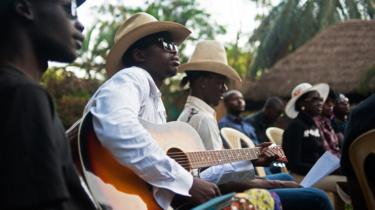
The lyrics seem to strike a chord with Ugandans. "They are so beautiful. There’s truth in every title, as they say," explains Churchill Olum, who's 24. He goes by the name Country Boy.
-
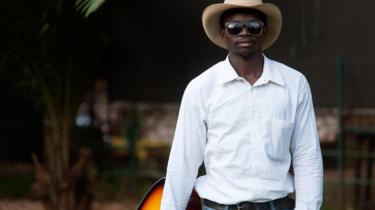
Country Boy got into the scene because his father liked Dolly Parton. "I grew up listening to country music and it just became part of me," he says.
-
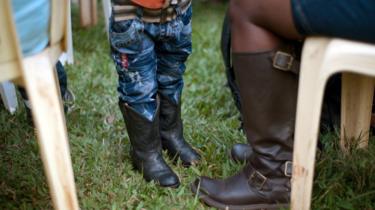
Uganda has the second youngest population in the world and country music seems to appeal across the generations.
-
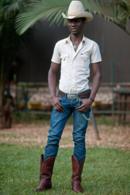
"From childhood I’ve been listening to country music," says Joshua Woods - whose real name is Kyagulanyi. "When I listen to it I become happy, the way it goes, the rhythms, instruments, guitar, the sound, it is cool. It is soft, it is open to every size, age, you know even kids. Some of the guys take it as an old style but it’s the best style."
-
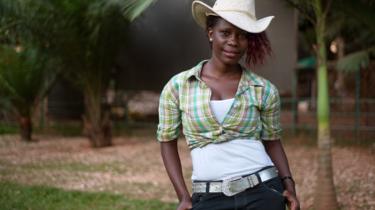
Viola Namuwawu from Bunga, a suburb of Kampala, says country music has "a message of things we face in life," which offers "solutions to problems, and other songs without those solutions pass a message - if it’s love, real love". The Why Factor: Radio Requests is broadcast on BBC World Service on 15 April.
Israel
Israel looks to Africa for new allies
The Jewish state is looking for other partners as traditional ties with Europe cool
This Place, Brooklyn Museum, New York — ‘Fragmentary visions’APRIL 6, 2016

© AFP
John Reed in Jerusalem
When Israel faced a resolution at the International Atomic Energy Agency last September demanding that it open its undeclared nuclear facilities to UN inspectors, the measure failed to pass. It foundered in part because several African countries — which normally would have voted in lock-step with Arab states — abstained or voted No.
The ballot was just one of many examples of a growing alignment between Israel and sub-Saharan African states: the Jewish state is searching for new allies as its traditionally close ties with Europe cool, and both it and African states face a common threat from radical Islamist groups.
Benjamin Netanyahu is planning a high-profile tour of four east African countries in July — the first to the continent by an Israeli leader in more than two decades. He will begin the visit with a ceremony in Entebbe, Uganda marking the 40th anniversary of the hostage rescue in which his brother Yonatan died. He will then travel to Kenya, Rwanda and Ethiopia.
“Israel is coming back to Africa; Africa is coming back to Israel,” Mr Netanyahu said at a recent meeting in the Knesset with Israeli MPs and African ambassadors. “It’s happening in a big way.”
Under perennial criticism at the UN by the EU over its illegal settlements on Palestinian lands, Israel is searching for new partners. Apart from Africa, Israel is also strengthening its diplomatic and economic ties with China, India and other developing countries.
Israeli officials speak of building a “wall of friendly countries” along a band of Africa that stretches from the Ivory Coast, Togo and Cameroon in the west to Rwanda and Kenya in the east.
“We have today a group of countries that are willing to vote with us, and the trend is growing,” says Yoram Elron, deputy director-general in Israel’s foreign ministry, responsible for relations with Africa. “This is one reason why Africa is growing in importance for us.”
African leaders have been queueing to visit Israel after decades of keeping their distance.
Uhuru Kenyatta, Kenyan president, was in Israel in February, the first visit by a Kenyan leader since 1994. Hanna Tetteh, Ghana’s foreign affairs minister, was in the country this month and discussed, according to an Israeli government communique, deepening economic and security co-operation, “especially the fight against Islamist terrorism”.
During Ms Tetteh’s visit, Mr Netanyahu also expressed “Israel’s expectation of continued change in voting patterns at the UN in light of anti-Israel decisions in international bodies”.
African countries want Israeli know-how in defence, cyber security and homeland security at a time when Libya is collapsing and Islamist fighters from Boko Haram to al-Shabaab are on the attack.
Israel has also reached agreement with two unnamed African countries on the voluntary repatriation of some of the 40,000 migrants and refugees from Sudan and Eritrea who crossed into the country from Egypt.
Refugee advocates say the two countries are Rwanda and Uganda, and believe that the states received Israeli arms or defence expertise in exchange.
“There has to be a quid pro quo,” says Jean-Marc Liling, a Jerusalem-based lawyer specialising in refugee law. “Why would an African country that is much poorer than Israel and has plenty of their own problems take in African refugees not from their own countries?”
Israel’s foreign and defence ministries declined to elaborate on the country’s defence deals with African countries when asked by the Financial Times.
For Israel, the relationships are coloured in part by regional rivalry. Israeli officials note that Iran, too, is expanding its diplomatic presence on the continent. Israelis have voiced concern about Shia militant group Hizbollah, which they believe is active in parts of west Africa’s Lebanese diaspora community.
Israel’s relations with South Africa, the continent’s second-largest economy and home to its largest Jewish community, remain strained. The ruling African National Congress has strong ties with the Palestinians and compares the Israeli government to the white apartheid regime. The “Boycott, Divestment, and Sanctions” movement is modelled on the international anti-apartheid movement and has a strong foothold in the country.
However, there are signs of a thaw. Dore Gold, director-general in the Israeli foreign ministry, travelled to South Africa this month in the first high-level visit in several years, meeting with officials and visiting Nelson Mandela’s Soweto home.
“To say we are about to have a completely different relationship is premature,” Mr Gold told the Times of Israel. “But there was a readiness to hear our arguments”.
Copyright The Financial Times Limited 2016. All rights reserved. You may share using our article tools. Please don't cut articles from FT.com and redistribute by email or post to the web.
https://next.ft.com/content/2c4123a8-ef59-11e5-9f20-c3a047354386
Israel looks to Africa for new allies
The Jewish state is looking for other partners as traditional ties with Europe cool
This Place, Brooklyn Museum, New York — ‘Fragmentary visions’APRIL 6, 2016

© AFP
John Reed in Jerusalem
When Israel faced a resolution at the International Atomic Energy Agency last September demanding that it open its undeclared nuclear facilities to UN inspectors, the measure failed to pass. It foundered in part because several African countries — which normally would have voted in lock-step with Arab states — abstained or voted No.
The ballot was just one of many examples of a growing alignment between Israel and sub-Saharan African states: the Jewish state is searching for new allies as its traditionally close ties with Europe cool, and both it and African states face a common threat from radical Islamist groups.
Benjamin Netanyahu is planning a high-profile tour of four east African countries in July — the first to the continent by an Israeli leader in more than two decades. He will begin the visit with a ceremony in Entebbe, Uganda marking the 40th anniversary of the hostage rescue in which his brother Yonatan died. He will then travel to Kenya, Rwanda and Ethiopia.
“Israel is coming back to Africa; Africa is coming back to Israel,” Mr Netanyahu said at a recent meeting in the Knesset with Israeli MPs and African ambassadors. “It’s happening in a big way.”
Under perennial criticism at the UN by the EU over its illegal settlements on Palestinian lands, Israel is searching for new partners. Apart from Africa, Israel is also strengthening its diplomatic and economic ties with China, India and other developing countries.
Israeli officials speak of building a “wall of friendly countries” along a band of Africa that stretches from the Ivory Coast, Togo and Cameroon in the west to Rwanda and Kenya in the east.
“We have today a group of countries that are willing to vote with us, and the trend is growing,” says Yoram Elron, deputy director-general in Israel’s foreign ministry, responsible for relations with Africa. “This is one reason why Africa is growing in importance for us.”
African leaders have been queueing to visit Israel after decades of keeping their distance.
Uhuru Kenyatta, Kenyan president, was in Israel in February, the first visit by a Kenyan leader since 1994. Hanna Tetteh, Ghana’s foreign affairs minister, was in the country this month and discussed, according to an Israeli government communique, deepening economic and security co-operation, “especially the fight against Islamist terrorism”.
During Ms Tetteh’s visit, Mr Netanyahu also expressed “Israel’s expectation of continued change in voting patterns at the UN in light of anti-Israel decisions in international bodies”.
African countries want Israeli know-how in defence, cyber security and homeland security at a time when Libya is collapsing and Islamist fighters from Boko Haram to al-Shabaab are on the attack.
Israel has also reached agreement with two unnamed African countries on the voluntary repatriation of some of the 40,000 migrants and refugees from Sudan and Eritrea who crossed into the country from Egypt.
Refugee advocates say the two countries are Rwanda and Uganda, and believe that the states received Israeli arms or defence expertise in exchange.
“There has to be a quid pro quo,” says Jean-Marc Liling, a Jerusalem-based lawyer specialising in refugee law. “Why would an African country that is much poorer than Israel and has plenty of their own problems take in African refugees not from their own countries?”
Israel’s foreign and defence ministries declined to elaborate on the country’s defence deals with African countries when asked by the Financial Times.
For Israel, the relationships are coloured in part by regional rivalry. Israeli officials note that Iran, too, is expanding its diplomatic presence on the continent. Israelis have voiced concern about Shia militant group Hizbollah, which they believe is active in parts of west Africa’s Lebanese diaspora community.
Israel’s relations with South Africa, the continent’s second-largest economy and home to its largest Jewish community, remain strained. The ruling African National Congress has strong ties with the Palestinians and compares the Israeli government to the white apartheid regime. The “Boycott, Divestment, and Sanctions” movement is modelled on the international anti-apartheid movement and has a strong foothold in the country.
However, there are signs of a thaw. Dore Gold, director-general in the Israeli foreign ministry, travelled to South Africa this month in the first high-level visit in several years, meeting with officials and visiting Nelson Mandela’s Soweto home.
“To say we are about to have a completely different relationship is premature,” Mr Gold told the Times of Israel. “But there was a readiness to hear our arguments”.
Copyright The Financial Times Limited 2016. All rights reserved. You may share using our article tools. Please don't cut articles from FT.com and redistribute by email or post to the web.
https://next.ft.com/content/2c4123a8-ef59-11e5-9f20-c3a047354386
Red Shield
Global Domination
hmmm.. guess it's getting near the time for the usa to dry up and blow away 

Africa Woos Europe to Return Stolen Funds
Africa woos Europe to return stolen funds

Photo: JCRules/allAfrica.com
African countries named in the Panama papers: The "staggering" volume of illicit practices and the number of global actors exposed demonstrate that governments of Africa and the rest of the world must act against tax havens, says former President Thabo Mbeki.
By Andualem Sisay
The African Union Commission continues to discuss with the European Commission the repatriation of illicit money from the continent, an official said.
"There are illicit funds from Africa in European banks. We started discussions with the European Union some years ago to bring back these funds. We find it morally and economically good for the banks to send the funds back," said the African Union Commission (AUC) chairperson, Dr Nkosazana Dlamini Zuma.
"We can use this money for implementations of Agenda 2063 and advance mother and children's health in the continent and the like," she said, Thursday evening at a brief press conference that followed the opening of the annual 'College-to College Meeting of AUC and European Commission (EC)'.
Africa loses around $50 billion every year through illicit finance flow, which is almost double the Official Development Assistance (ODA) the continent receives, according to the 2015 UN report by a high-level panel on illicit cash transfers, chaired by former Nigerian President Olusegun Obasanjo.
The two sides also discussed various areas of cooperation, ranging from tackling migration to fighting terrorism, according to Ms Federica Mogherini, the Vice-President of the EC High Representative of the Union for Foreign Affairs and Security Policy.
"Investing in African security is like investing in security of the world... We have been engaged with 35 AU member states on different areas of cooperation with joint action plans. In addition, we are also already engaged bilaterally with 13 of these countries in different projects, including local community support and border management," Ms Mogherini said.
"It is not a one size fits all approach. With EU trust Fund for Africa, we are financing various projects in the Horn of Africa, Sahel and Lake Chad regions," she said, stating that EU had already allocated 715 million Euros for such projects.
The discussions were centred around the priority areas of the 2014 - 2017 Roadmap adopted at the Africa-EU Summit in Brussels, Belgium in 2014. They include peace and security, human development, global and emerging issues as well as democracy.

Left, Federica Mogherini, the Vice President of the European Commission High Representative of the Union for Foreign Affairs and Security Policy at a press conference with Dr Nkosazana Dlamini-Zuma, the chairperson of the African Union Commission on April 7, 2016 in Addis Ababa, Ethiopia. PHOTO | ANDUALEM SISAY
Africa woos Europe to return stolen funds

Photo: JCRules/allAfrica.com
African countries named in the Panama papers: The "staggering" volume of illicit practices and the number of global actors exposed demonstrate that governments of Africa and the rest of the world must act against tax havens, says former President Thabo Mbeki.
By Andualem Sisay
The African Union Commission continues to discuss with the European Commission the repatriation of illicit money from the continent, an official said.
"There are illicit funds from Africa in European banks. We started discussions with the European Union some years ago to bring back these funds. We find it morally and economically good for the banks to send the funds back," said the African Union Commission (AUC) chairperson, Dr Nkosazana Dlamini Zuma.
"We can use this money for implementations of Agenda 2063 and advance mother and children's health in the continent and the like," she said, Thursday evening at a brief press conference that followed the opening of the annual 'College-to College Meeting of AUC and European Commission (EC)'.
Africa loses around $50 billion every year through illicit finance flow, which is almost double the Official Development Assistance (ODA) the continent receives, according to the 2015 UN report by a high-level panel on illicit cash transfers, chaired by former Nigerian President Olusegun Obasanjo.
The two sides also discussed various areas of cooperation, ranging from tackling migration to fighting terrorism, according to Ms Federica Mogherini, the Vice-President of the EC High Representative of the Union for Foreign Affairs and Security Policy.
"Investing in African security is like investing in security of the world... We have been engaged with 35 AU member states on different areas of cooperation with joint action plans. In addition, we are also already engaged bilaterally with 13 of these countries in different projects, including local community support and border management," Ms Mogherini said.
"It is not a one size fits all approach. With EU trust Fund for Africa, we are financing various projects in the Horn of Africa, Sahel and Lake Chad regions," she said, stating that EU had already allocated 715 million Euros for such projects.
The discussions were centred around the priority areas of the 2014 - 2017 Roadmap adopted at the Africa-EU Summit in Brussels, Belgium in 2014. They include peace and security, human development, global and emerging issues as well as democracy.

Left, Federica Mogherini, the Vice President of the European Commission High Representative of the Union for Foreign Affairs and Security Policy at a press conference with Dr Nkosazana Dlamini-Zuma, the chairperson of the African Union Commission on April 7, 2016 in Addis Ababa, Ethiopia. PHOTO | ANDUALEM SISAY
7 APRIL 2016
Africa: Japan's Africa Ambitions
Last week, Japanese Prime Minister Shinzo Abe hosted Zimbabwean President Robert Mugabe for an official five-day visit in Tokyo. Abe has now met Mugabe three times, despite Harare's isolation from the West - and, more acutely to Japan - especially the United States.
Zimbabwe remains under a number of sanctions from the US and some European countries, which have repeatedly called out Zimbabwe for its record on human rights issues. The hosting of Mugabe reveals the duelling pressures that face Japan as it looks to engage more states in Africa while still maintaining its image as a democratic state that promotes a rules-based order.
Bilateral ties
During the summit, Abe focused efforts on securing Mugabe's support for Japan's policy of reforming the United Nations Security Council (UNSC) to include more permanent members.
Mugabe and Abe agreed that the UNSC "does not fully reflect the realities of the international community in the 21st century" (PDF). Tokyo has long held the belief that this reform is necessary and that the current Permanent Five structure is out of touch with current geopolitical realities (PDF).
Japan's efforts over the years to lobby for its inclusion in an expanded permanent Security Council have resulted in Tokyo casting a wide diplomatic net in Africa, where numerous countries support UNSC reform.
Tokyo also took the opportunity to explain its new security legislation - enacted last month - and its policy of a "proactive contribution to peace". Japan highlighted its role in Africa as an example of this - for example its contributions to peacekeeping operations in South Sudan.
Tokyo's contribution in South Sudan, where it has deployed more than 400 Self-Defense Forces (SDF), is operating under the umbrella of the UN Mission in the Republic of South Sudan.
Abe and Mugabe also agreed to a package of investment and assistance projects that Japan would provide Zimbabwe in the coming years, including $5m dedicated to infrastructure improvement as well as continuing a $15m project on irrigation enhancement.
Zimbabwe also inked a memorandum of understanding with the Japan Oil, Gas and Metals National Corporation to help facilitate Japan's investment in Harare's mining sector.
China factor
Despite these announcements, Japan's ties with Zimbabwe remain quite limited and don't rival those of China. Indeed, Mugabe was given the title of "old friend" by Chinese President Xi Jinping during his last visit to China in 2014.
China also has invested billions of dollars in Zimbabwe's energy and infrastructure sectors. Meanwhile, Zimbabwe endeared itself to Beijing by adopting the Chinese yuan as its international currency last year - becoming the first country in the world to do so.
Therefore, Abe's eagerness to court Harare is motivated less by replacing Chinese influence and more through providing an option of diversification in Asia and weakening Beijing's monopoly.
While Abe did visit Africa (Ethiopia, Mozambique and Ivory Coast) in 2014, his engagement with the continent has not been as strong as similar outreach in Asia, Europe and the Middle East.
Over the past five years, Tokyo has been averaging more than $4bn in foreign direct investment to Africa. This number is steadily climbing, but still pales in comparison to what other Organization for Economic Cooperation and Development (OECD) countries have invested there, and is just a fraction of the $16bn that China had invested by the end of 2011.
Simply put, Japan is still in the backseat with regard to engagement with the continent as China continues to pour billions across Africa.
Comprehensive approach
A renewed focus now should take a more holistic and diverse look at engaging with the continent encompassing development assistance, investment opportunities and stronger political-security cooperation.
There are 49 countries in Sub-Saharan Africa through which Japan has been looking to enhance relationships with to gain support in international bodies, such as the UN. Japan should also look to leverage this year's Sixth Tokyo International Conference on African Development (TICAD) - a very successful forum through which Japan has solidified its reputation in Africa.
But aside from UNSC reform and economic competition with China, there are other important drivers for stronger ties, including the growth of violent extremism in North and West Africa, highlighted by the sustained challenge of Boko Haram and al-Qaeda along with the more recent emergence of the Islamic State of Iraq and the Levant (ISIL, also known as ISIS) in Libya.
There is also the threat of piracy around the Horn of Africa and Japan's deployment of SDF in Djibouti to take part in a multilateral policing action there to mitigate those threats. Security issues in Africa are no longer strictly peripheral for Tokyo.
In sum, Japan's strategic interests in Africa are diverse. Despite this, Tokyo should not play the game of jostling and one-upmanship with China in Africa, but rather accentuate its strengths and continue the current diplomatic uptick which aligns with the continent's growth in the coming years.
J Berkshire Miller is the director of the Council on International Policy and is a fellow on East Asia for the EastWest Institute. The views expressed in this article are the author's own and do not necessarily reflect Al Jazeera's editorial policy.
This story from Al Jazeera was supplied to AllAfrica under an agreement with the African Media Agency.
Africa: Japan's African Ambitions
Africa: Japan's Africa Ambitions
Last week, Japanese Prime Minister Shinzo Abe hosted Zimbabwean President Robert Mugabe for an official five-day visit in Tokyo. Abe has now met Mugabe three times, despite Harare's isolation from the West - and, more acutely to Japan - especially the United States.
Zimbabwe remains under a number of sanctions from the US and some European countries, which have repeatedly called out Zimbabwe for its record on human rights issues. The hosting of Mugabe reveals the duelling pressures that face Japan as it looks to engage more states in Africa while still maintaining its image as a democratic state that promotes a rules-based order.
Bilateral ties
During the summit, Abe focused efforts on securing Mugabe's support for Japan's policy of reforming the United Nations Security Council (UNSC) to include more permanent members.
Mugabe and Abe agreed that the UNSC "does not fully reflect the realities of the international community in the 21st century" (PDF). Tokyo has long held the belief that this reform is necessary and that the current Permanent Five structure is out of touch with current geopolitical realities (PDF).
Japan's efforts over the years to lobby for its inclusion in an expanded permanent Security Council have resulted in Tokyo casting a wide diplomatic net in Africa, where numerous countries support UNSC reform.
Tokyo also took the opportunity to explain its new security legislation - enacted last month - and its policy of a "proactive contribution to peace". Japan highlighted its role in Africa as an example of this - for example its contributions to peacekeeping operations in South Sudan.
Tokyo's contribution in South Sudan, where it has deployed more than 400 Self-Defense Forces (SDF), is operating under the umbrella of the UN Mission in the Republic of South Sudan.
Abe and Mugabe also agreed to a package of investment and assistance projects that Japan would provide Zimbabwe in the coming years, including $5m dedicated to infrastructure improvement as well as continuing a $15m project on irrigation enhancement.
Zimbabwe also inked a memorandum of understanding with the Japan Oil, Gas and Metals National Corporation to help facilitate Japan's investment in Harare's mining sector.
China factor
Despite these announcements, Japan's ties with Zimbabwe remain quite limited and don't rival those of China. Indeed, Mugabe was given the title of "old friend" by Chinese President Xi Jinping during his last visit to China in 2014.
China also has invested billions of dollars in Zimbabwe's energy and infrastructure sectors. Meanwhile, Zimbabwe endeared itself to Beijing by adopting the Chinese yuan as its international currency last year - becoming the first country in the world to do so.
Therefore, Abe's eagerness to court Harare is motivated less by replacing Chinese influence and more through providing an option of diversification in Asia and weakening Beijing's monopoly.
While Abe did visit Africa (Ethiopia, Mozambique and Ivory Coast) in 2014, his engagement with the continent has not been as strong as similar outreach in Asia, Europe and the Middle East.
Over the past five years, Tokyo has been averaging more than $4bn in foreign direct investment to Africa. This number is steadily climbing, but still pales in comparison to what other Organization for Economic Cooperation and Development (OECD) countries have invested there, and is just a fraction of the $16bn that China had invested by the end of 2011.
Simply put, Japan is still in the backseat with regard to engagement with the continent as China continues to pour billions across Africa.
Comprehensive approach
A renewed focus now should take a more holistic and diverse look at engaging with the continent encompassing development assistance, investment opportunities and stronger political-security cooperation.
There are 49 countries in Sub-Saharan Africa through which Japan has been looking to enhance relationships with to gain support in international bodies, such as the UN. Japan should also look to leverage this year's Sixth Tokyo International Conference on African Development (TICAD) - a very successful forum through which Japan has solidified its reputation in Africa.
But aside from UNSC reform and economic competition with China, there are other important drivers for stronger ties, including the growth of violent extremism in North and West Africa, highlighted by the sustained challenge of Boko Haram and al-Qaeda along with the more recent emergence of the Islamic State of Iraq and the Levant (ISIL, also known as ISIS) in Libya.
There is also the threat of piracy around the Horn of Africa and Japan's deployment of SDF in Djibouti to take part in a multilateral policing action there to mitigate those threats. Security issues in Africa are no longer strictly peripheral for Tokyo.
In sum, Japan's strategic interests in Africa are diverse. Despite this, Tokyo should not play the game of jostling and one-upmanship with China in Africa, but rather accentuate its strengths and continue the current diplomatic uptick which aligns with the continent's growth in the coming years.
J Berkshire Miller is the director of the Council on International Policy and is a fellow on East Asia for the EastWest Institute. The views expressed in this article are the author's own and do not necessarily reflect Al Jazeera's editorial policy.
This story from Al Jazeera was supplied to AllAfrica under an agreement with the African Media Agency.
Africa: Japan's African Ambitions
Misreeya
Pro


Coaching Library
World Stats | Africa Stats | America Stats | Asia Stats | Europe Stats | EU Stats | Mid East Stats | Oceania Stats | Links

Internet Usage Statistics for Africa
( Africa Internet Usage and 2015 Population Stats )
INTERNET USERS AND POPULATION STATISTICS FOR AFRICA
AFRICA REGION
Population
(2015 Est.)
Pop. %
of World
Internet Users,
Latest
Penetration
(% Population)
Internet
% Users
15-Nov-2015
Total for Africa
1,158,355,663
16.0 %
330,965,359
28.6 %
9.8 %
124,568,500
Rest of World
6,101,546,580
84.0 %
3,035,295,797
49.7 %
90.2 %
1,390,635,650
WORLD TOTAL
7,259,902,243
100.0 %
3,366,261,156
46.4 %
100.0 %
1,515,204,150
NOTES: (1) Africa Population data are 2015 mid-year estimates. (2) Africa Internet Usage Statistics in this table are for November 30, 2015. (3) The Facebook subscriber data are for Nov. 15, 2015, the last available from FB. (4) CLICK on each region or country name for details for each individual location. (5) For methology, help and definitions please see the site surfing guide. (6) Population estimates are based mainly on figures from the U.S. Census Bureau and local sources. (7) The Internet usage numbers come mainly from data published by WWW , ITU , the Nielsen Company, Facebook, and other trustworthy sources. (8) Data from this table may be cited, giving the due credit and establishing an active link back to Internet World Stats. Copyright © 2016, Miniwatts Marketing Group. All rights reserved worldwide.
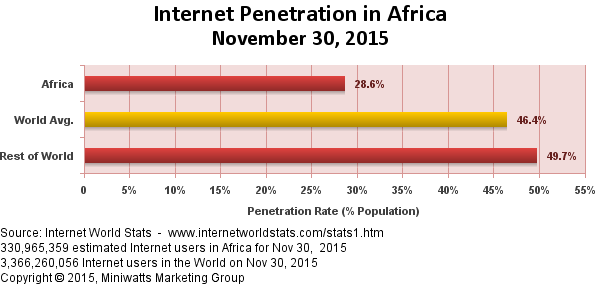
AFRICA
Population
(2015 Est.)
Internet Users
31-Dec-2000
Internet Users
30-Nov-2015
Penetration
(% Population)
Internet
% Africa
15-Nov-2015
Algeria
39,542,166
50,000
11,000,000
27.8 %
3.3 %
11,000,000
Angola
19,625,353
30,000
5,102,592
26.0 %
1.5 %
3,300,000
Benin
10,448,647
15,000
1,232,940
11.8 %
0.4 %
570,000
Botswana
2,182,719
15,000
620,000
28.4 %
0.2 %
620,000
Burkina Faso
18,931,686
10,000
1,779,578
9.4 %
0.5 %
490,000
Burundi
10,742,276
3,000
526,372
4.9 %
0.2 %
340,000
Cabo Verde
545,993
8,000
219,817
40.3 %
0.1 %
190,000
Cameroon
23,739,218
20,000
2,611,314
11.0 %
0.8 %
1,400,000
Central African Rep.
5,391,539
1,500
217,279
4.0 %
0.1 %
61,000
Chad
11,631,456
1,000
317,197
2.7 %
0.1 %
200,000
Comoros
780,971
1,500
54,512
7.0 %
0.0 %
50,000
Congo
4,755,097
500
338,087
7.1 %
0.1 %
300,000
Congo, Dem. Rep.
79,375,136
500
2,381,254
3.0 %
0.7 %
1,900,000
Cote d'Ivoire
23,295,302
40,000
5,230,000
22.5 %
1.6 %
1,800,000
Djibouti
828,324
1,400
100,000
12.1 %
0.0 %
100,000
Egypt
88,487,396
450,000
48,300,000
54.6 %
14.6 %
27,000,000
Equatorial Guinea
740,743
500
139,704
18.9 %
0.0 %
52,000
Eritrea
6,527,689
5,000
67,000
1.0 %
0.0 %
67,000
Ethiopia
99,465,819
10,000
3,700,000
3.7 %
1.1 %
3,700,000
Gabon
1,705,336
15,000
670,197
39.3 %
0.2 %
360,000
Gambia
1,967,709
4,000
373,865
19.0 %
0.1 %
180,000
Ghana
26,327,649
30,000
5,171,993
19.6 %
1.6 %
2,900,000
Guinea
11,780,162
8,000
770,000
6.5 %
0.2 %
770,000
Guinea-Bissau
1,726,170
1,500
70,000
4.1 %
0.0 %
70,000
Kenya
45,925,301
200,000
31,985,048
69.6 %
9.7 %
5,000,000
Lesotho
1,947,701
4,000
250,000
12.8 %
0.1 %
250,000
Liberia
4,195,666
500
348,240
8.3 %
0.1 %
260,000
Libya
6,411,776
10,000
2,400,000
37.4 %
0.7 %
2,400,000
Madagascar
23,812,681
30,000
1,100,000
4.6 %
0.3 %
1,100,000
Malawi
17,715,075
15,000
1,080,620
6.1 %
0.3 %
700,000
Mali
16,955,536
18,800
1,186,888
7.0 %
0.4 %
770,000
Mauritania
3,596,702
5,000
455,553
12.7 %
0.1 %
250,000
Mauritius
1,339,827
87,000
803,896
60.0 %
0.2 %
580,000
Mayotte (FR)
220,300
n/a
107,940
49.0 %
0.0 %
49,000
Morocco
33,322,699
100,000
20,207,154
60.6 %
6.1 %
10,000,000
Mozambique
25,303,113
30,000
1,503,005
5.9 %
0.5 %
1,200,000
Namibia
2,212,307
30,000
470,000
21.2 %
0.1 %
470,000
Niger
18,045,729
5,000
351,892
2.0 %
0.1 %
230,000
Nigeria
181,562,056
200,000
92,699,924
51.1 %
28.0 %
15,000,000
Reunion (FR)
867,687
130,000
380,000
43.8 %
0.1 %
380,000
Rwanda
12,661,733
5,000
3,216,080
25.4 %
1.0 %
510,000
Saint Helena (UK)
4,513
n/a
1,800
39.9 %
0.0 %
1,500
Sao Tome & Principe
194,006
6,500
48,806
25.2 %
0.0 %
32,000
Senegal
13,975,834
40,000
7,260,000
51.9 %
2.2 %
1,700,000
Seychelles
92,430
6,000
50,220
54.3 %
0.0 %
39,000
Sierra Leone
5,879,098
5,000
260,000
4.4 %
0.1 %
260,000
Somalia
10,616,380
200
500,000
4.7 %
0.2 %
500,000
South Africa
54,777,809
2,400,000
26,841,126
49.0 %
8.1 %
13,000,000
South Sudan
12,042,910
n/a
1,914,823
15.9 %
0.6 %
150,000
Sudan
36,108,853
30,000
9,307,189
25.8 %
2.8 %
n/a
Swaziland
1,435,613
10,000
389,051
27.1 %
0.1 %
160,000
Tanzania
51,045,882
115,000
7,590,794
14.9 %
2.3 %
2,700,000
Togo
7,552,318
100,000
430,482
5.7 %
0.1 %
280,000
Tunisia
11,037,225
100,000
5,408,240
49.0 %
1.6 %
5,200,000
Uganda
37,101,745
40,000
11,924,927
32.1 %
3.6 %
1,800,000
Western Sahara
554,795
n/a
27,000
4.9 %
0.0 %
27,000
Zambia
15,066,266
20,000
2,711,928
18.0 %
0.8 %
1,300,000
Zimbabwe
14,229,541
50,000
6,759,032
47.5 %
2.0 %
850,000
TOTAL AFRICA
1,158,355,663
4,514,400
330,965,359
28.6 %
100.0 %
124,568,500
NOTES: (1) Africa Internet Statistics were updated for November 30, 2015. (2) Africa Facebook subscribers are for November 15, 2015. (3) CLICK on each country name for further data on individual countries and regions. (4) Africa Population numbers are mid-year 2015 estimates, based on data mainly from the U.S. Census Bureau and local census offices. (5) For definitions, navigation help and methodologys, see the site surfing guide. (6) Africa Internet usage information comes mainly from data published by WWW, ITU , Facebook, and other trustworthy sources. (7) For Internet growth comparison purposes, baseline Internet usage data for the year 2000 is displayed. (8) Data from this table may be cited, giving the due credit and establishing an active link back to internetworldstats.com Copyright 2016, © Miniwatts Marketing Group. All rights reserved worldwide.

Africa Mobile Broadband Market Report
The African region is witnessing one of the strongest increases in mobile data use in the world. Forecasts suggest that mobile internet traffic across Africa will double between 2014 and 2015, and will see a 20-fold increase by the end of the decade. Get all the facts here, in this 176 page report.
Africa Mobile Voice Market and Major Network Operators
As a result of fixed-line limitations, mobile services still represent more than 90% of all telephone lines in service in Africa. The popularity of cheaper prepaid services, which in some markets account for up to 98% of all mobile subscribers, as well as a steady fall in tariffs has meant that an increasing proportion of the population can both access and afford a mobile phone. Get all the data here.
More Telecommunications in Africa Market Reports
Get the latest Telecoms, Broadband and Internet in Africa reports,
see the information summary and table of contents.
^ top of page

Including - Insights, Forecasts, Analysis and Statistics
Crazy, despite our problems we made the top ten, but then again even in the dessert nomads have cell phones and internet service, again crazy.
Africa Internet Users, Facebook and 2015 Population Statistics